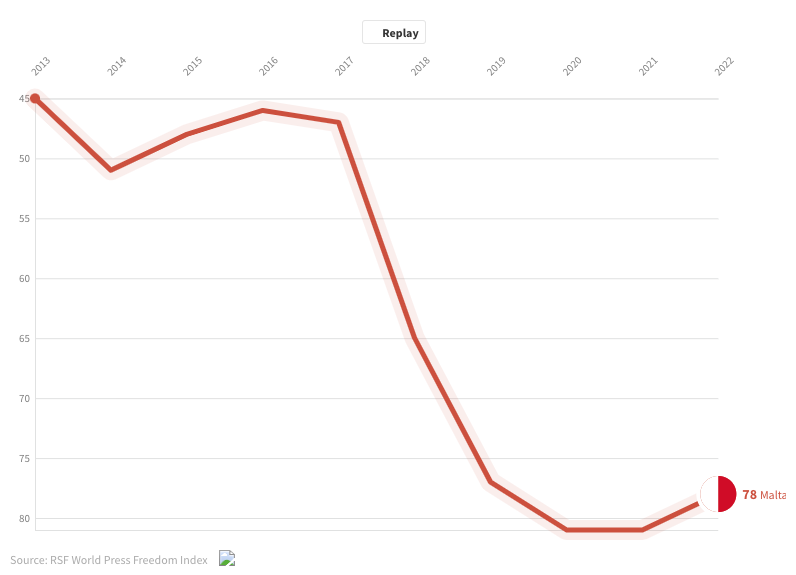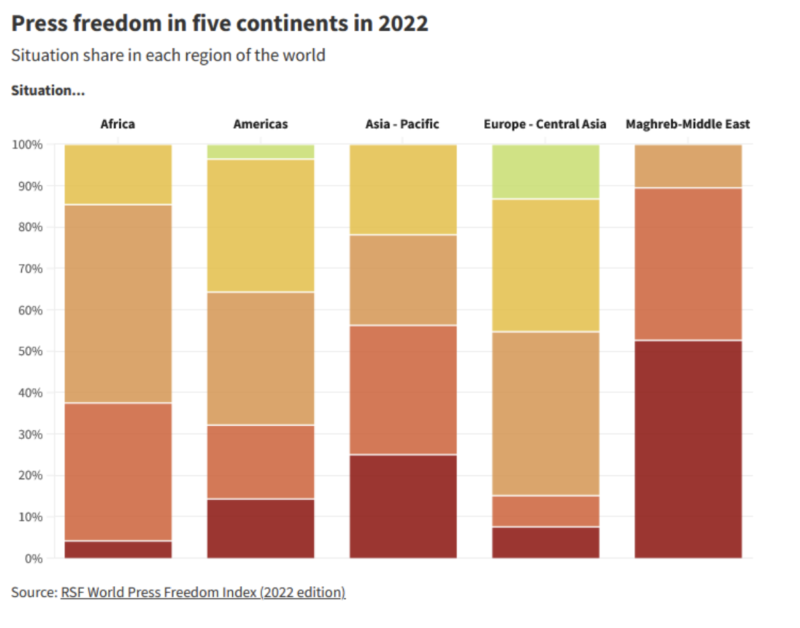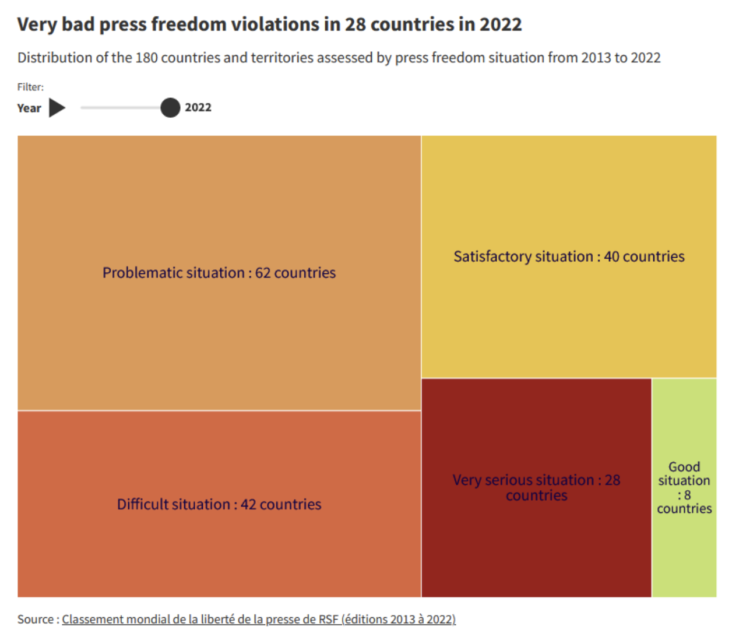Malta has improved its ranking by three places according to the 2022 Reporters Without Borders (RSF) World Press Freedom Index.
According to the international report published on Tuesday, Malta’s press freedom environment is still classified as “problematic” but the country is now ranked number 78, after the country’s free fall in ranking since the Labour Party was elected in 2013.
The slight improvement in this year’s Index is largely due to the conclusions and recommendations by the public inquiry board tasked with establishing the extent of the State’s role in the assassination of journalist Daphne Caruana Galizia.
RSF notes that Malta has made some progress in the fight for justice for Caruana Galizia and press freedom reforms, however, those responsible for her murder in 2017, have not yet been convicted.
To date, even after the findings of the public inquiry, those responsible for violence and threats against journalists enjoy complete impunity including those high-level officials whose corruption Caruana Galizia was investigating at the time of her death.
In addition, the Maltese government has so far failed to implement any of the recommendations put forward by the board of the public inquiry. The one recommendation that has so far been taken up by the authorities was the setting up of a committee of media experts to consult on press freedom reforms but then had no say in the drafting of the media reform Bills that remain limited in scope.
Malta also continues to have a highly polarised press environment dominated by party-owned media. Since the Labour Party came into power in 2013, Malta’s press freedom ranking plummeted a staggering 36 places, from number 45 in 2013 to number 77 in 2019, and losing a further four places in 2020 placing the country at 81, a score that remained unchanged last year.

Malta’s press freedom rankings from 2013 onwards. Source RSF Press Freedom Index
Within the EU 27 countries, Malta now sits above Hungary, Bulgaria and Greece, the latter now ranked last in the EU after dropping 38 places from 70 in 2021 to 103.
The World Press Freedom Index, an annual report on the state of journalism in 180 countries describes a patchwork of positive and negative developments in Europe. Norway (1) remains at the top of the World Press Freedom Index. Estonia (4) and Lithuania (9) – two former Communist States – are now among the top 10 countries, while Greece (108) has replaced Bulgaria (91) in last place in Europe.
Some EU and neighbouring governments have further intensified draconian laws against journalists, such as Slovenia (54), Poland (66), Hungary (85), Albania (103), and Greece. Serbia (79), on the other hand, scored points in the fight against impunity, while the governments of the Czech Republic and Bulgaria eased their grip on the press following changes in government.
Meanwhile, European institutions have started to implement protective measures for journalists and press freedom and have launched proceedings against Hungary (85) for violating European law. However, media that disseminates Russian propaganda in the context of the invasion of Ukraine (106) launched by Vladimir Putin was banned in Europe without an appropriate legal framework, setting a dangerous pretext for retaliatory actions against European media, the report notes.

In Eastern Europe, beyond the human tragedies, the war waged by Russia (155) against Ukraine is creating devastating consequences for press freedom in the region.
As many as five journalists and media workers have died because of gunfire during the first month of the Russian offensive, which began on 24 February 2022. In Russia (155) itself, the government has taken complete control of news and information by establishing extensive wartime censorship, blocking the media and hounding non-compliant journalists, forcing many of them into exile.
Beyond Europe, the Index highlights the disastrous effects of news and information chaos and the effects that globalised and unregulated online information spaces have on societies. Media polarisation is feeding and reinforcing internal social divisions in democratic societies such as the United States (42), despite President Joe Biden’s election.
The increase in social and political divisions is being further fuelled by the spread of disinformation on social media and an increase in opinion media, especially in France (26).
This year, press freedom conditions have been classified as “very bad” in a record 28 countries including Belarus (153) and Russia (155).

The world’s 10 worst countries for press freedom include Myanmar (176), where the February 2021 coup d’état set press freedom back by 10 years, as well as China, Turkmenistan (177), Iran (178), Eritrea (179) and North Korea (180).
RSF Secretary-General Christophe Deloire said: “Margarita Simonyan, the Editor in Chief of RT (the former Russia Today), revealed what she really thinks in a Russia One TV broadcast when she said, ‘no great nation can exist without control over information’.
“The creation of media weaponry in authoritarian countries eliminates their citizens’ right to information but is also linked to the rise in international tension, which can lead to the worst kind of wars. Domestically, the ‘Fox News-isation’ of the media poses a fatal danger for democracies because it undermines the basis of civil harmony and tolerant public debate. Urgent decisions are needed in response to these issues, promoting a New Deal for Journalism, as proposed by the Forum on Information and Democracy and adopting an appropriate legal framework, with a
system to protect democratic online information spaces.”
The full World Press Freedom Index can be found here.












